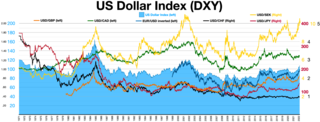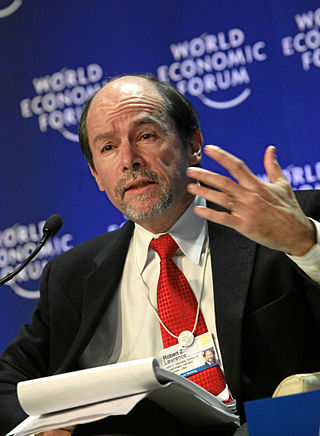Robert Z. Aliber | |
|---|---|
| Born | 19 September 1930 |
| Academic background | |
| Alma mater | |
| Academic work | |
| Discipline | economics |
| Sub-discipline | international economics |
| Institutions | University of Chicago |
| Main interests | foreign direct investment |
Robert Zelwin Aliber (born September 19,1930) is a professor emeritus of International Economics and Finance at the University of Chicago. [1] He is best known for his contribution to the theory of foreign direct investment. He has given the concept of foreign exchange rate in foreign direct investment. Aliber argues that a multinational corporation from hard currency area can borrow at lower rates in a soft currency country than can local firms.[ citation needed ]
Aliber received a Bachelor of Arts degree from Williams College (1952) and Bachelor of Arts (1954) and a Master of Arts (1957) from Cambridge University. He received his Ph.D. from Yale University. He has been a staff economist at the Commission on Money and Credit (1959–61) and at the Committee for Economic Development (1961–64). Aliber served as a senior economic advisor at the United States Agency for International Development (1964–65). He was appointed as an associate professor at the University of Chicago in 1964. [2]
He is mentioned in Michael Lewis' book Travels in the New Third World as having predicted the Icelandic financial crisis several years before it happened.

James Joseph Heckman is an American economist and Nobel laureate who serves as the Henry Schultz Distinguished Service Professor in Economics at the University of Chicago, where he is also a professor at the College, a professor at the Harris School of Public Policy, Director of the Center for the Economics of Human Development (CEHD), and Co-Director of Human Capital and Economic Opportunity (HCEO) Global Working Group. He is also a professor of law at the Law School, a senior research fellow at the American Bar Foundation, and a research associate at the NBER. He received the John Bates Clark Medal in 1983, and the Nobel Memorial Prize in Economic Sciences in 2000, which he shared with Daniel McFadden. He is known principally for his pioneering work in econometrics and microeconomics.

Robert Alexander Mundell was a Canadian economist. He was a professor of economics at Columbia University and the Chinese University of Hong Kong.

Rüdiger Dornbusch was a German economist who worked in the United States for most of his career.

The 1997 Asian financial crisis was a period of financial crisis that gripped much of East and Southeast Asia during the late 1990s. The crisis began in Thailand in July 1997 before spreading to several other countries with a ripple effect, raising fears of a worldwide economic meltdown due to financial contagion. However, the recovery in 1998–1999 was rapid, and worries of a meltdown quickly subsided.

The foreign exchange market is a global decentralized or over-the-counter (OTC) market for the trading of currencies. This market determines foreign exchange rates for every currency. It includes all aspects of buying, selling and exchanging currencies at current or determined prices. In terms of trading volume, it is by far the largest market in the world, followed by the credit market.

Gustavo Henrique de Barroso Franco is a Brazilian economist. Former Governor of the Brazilian Central Bank, is best known for being one of the "fathers" of the Real Plan, the 1994 monetary reform that ended hyperinflation in Brazil. He teaches economics at the Catholic University in Rio de Janeiro since 1986. He is also a businessman, consultant and has served on many boards. He founded Rio Bravo Investimentos where he works as Senior Advisor. He has written several books, academic papers and contributes regularly to newspapers and magazines.

An exchange rate regime is a way a monetary authority of a country or currency union manages the currency about other currencies and the foreign exchange market. It is closely related to monetary policy and the two are generally dependent on many of the same factors, such as economic scale and openness, inflation rate, the elasticity of the labor market, financial market development, and capital mobility.

Strong dollar policy is United States economic policy based on the assumption that a "strong" exchange rate of the United States dollar is in the interests of the United States. In 1971, Treasury Secretary John Connally famously remarked how the US dollar was "our currency, but your problem," referring to how the US dollar was managed primarily for the US' interests despite it being the currency primarily used in global trade and global finance. A strong dollar is recognized to have many benefits but also potential downsides. Domestically in the US, the policy keeps inflation low, encourages foreign investment, and maintains the currency's role in the global financial system. Globally, a strong dollar is thought to be harmful for the rest of the world. In financial markets, the strength of the dollar is measured in the "DXY Index", an index which measures the exchange rate of the dollar relative to other major currencies.
A financial crisis is any of a broad variety of situations in which some financial assets suddenly lose a large part of their nominal value. In the 19th and early 20th centuries, many financial crises were associated with banking panics, and many recessions coincided with these panics. Other situations that are often called financial crises include stock market crashes and the bursting of other financial bubbles, currency crises, and sovereign defaults. Financial crises directly result in a loss of paper wealth but do not necessarily result in significant changes in the real economy.
International business refers to the trade of Goods and service goods, services, technology, capital and/or knowledge across national borders and at a global or transnational scale.
Ricardo Hausmann is the former Director of the Center for International Development currently leading the Center for International Development's Growth Lab and is a Professor of the Practice of Economic Development at the Harvard Kennedy School at Harvard University. He is also a former Venezuelan Minister of Planning and former Head of the Presidential Office of Coordination and Planning (1992–1993). He co-introduced several regularly used concepts in economics including original sin, growth diagnostics, self-discovery, dark matter, the product space, and economic complexity.
Stephen Herbert Hymer was a Canadian economist. His research focused on the activities of multinational firms, which was the subject of his PhD dissertation The International Operations of National Firms: A Study of Direct Foreign Investment, presented in 1960, but published posthumously in 1976, by the Department of Economics from Massachusetts Institute of Technology. Charles P. Kindleberger, his thesis supervisor, submitted it for publication, as mentioned by him on the introduction of Hymer's thesis dissertation.
Foreign exchange risk is a financial risk that exists when a financial transaction is denominated in a currency other than the domestic currency of the company. The exchange risk arises when there is a risk of an unfavourable change in exchange rate between the domestic currency and the denominated currency before the date when the transaction is completed.

Robert Zachary Lawrence is a South Africa-born American economist and Albert L. Williams Professor of International Trade and Investment at John F. Kennedy School of Government at Harvard University. He is also a senior fellow at the Peterson Institute for International Economics, and a research associate at the National Bureau of Economic Research.
Maurice Kugler is a Colombian American economist born in 1967. He received his Ph.D. in economics from UC Berkeley in 2000, as well as an M.Sc. (Econ) and a B.Sc. (Econ) both from the London School of Economics. Kugler is professor of public policy in the Schar School of Policy and Government at George Mason University. Prior to this, he worked as a consultant for the World Bank, where he was senior economist before (2010-2012). Most recently he was principal research scientist and managing director at IMPAQ International.
Raj Aggarwal is an author and contributor to the fields of finance and international business studies. Aggarwal was the dean of the University of Akron College of Business Administration from 2006 until 2009. He was elected as a fellow of the Academy of International Business. He has worked as an engineer, financial analyst, strategic planner, department chair, university budget planner and corporate board member. He has authored or co-authored over a dozen books or monographs and over a hundred scholarly articles that have cited over 5,000 times according to his profile in Google Scholar.
The University of CEMA is a private university in Buenos Aires, Argentina. It was founded by Carlos Rodríguez, along with Roque Fernández and Pedro Pou, as the Center for Macro-economic Studies of Argentina (CEMA) University Institute in 1995, a pioneer in higher education programs in the areas of economics, politics, management, and finance in Argentina.
Robert Eisner was an American author and William R. Kenan professor of economics at Northwestern University. He was recognized throughout the United States for his expertise and knowledge of macroeconomics and the economics of business cycles. He was a regular contributor to the Wall Street Journal, The New York Times, Chicago Tribune, and The Los Angeles Times, primarily covering national economic policy and reform.

David I. Meiselman was an American economist. Among his contributions to the field of economics are his work on the term structure of interest rates, the foundation today of the implementation of monetary policy by major central banks, and his work with Milton Friedman on the impact of monetary policy on the performance of the economy and inflation.